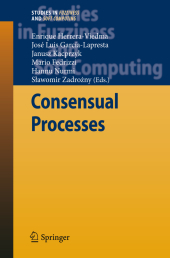 Neuerscheinungen 2013Stand: 2020-01-07 |
Schnellsuche
ISBN/Stichwort/Autor
|
Herderstraße 10
10625 Berlin
Tel.: 030 315 714 16
Fax 030 315 714 14
info@buchspektrum.de |

Mario Fedrizzi, José L. García-Lapresta, Enrique Herrera-Viedma, Janusz Kacprzyk, Hannu Nurmi, Slawomir Zadrozny
(Beteiligte)
Consensual Processes
Herausgegeben von Herrera-Viedma, Enrique; García-Lapresta, José Luis; Kacprzyk, Janusz; Fedrizzi, Mario; Nurmi, Hannu
2013. xviii, 430 S. 62 SW-Abb. 235 mm
Verlag/Jahr: SPRINGER, BERLIN 2013
ISBN: 3-642-26825-0 (3642268250)
Neue ISBN: 978-3-642-26825-0 (9783642268250)
Preis und Lieferzeit: Bitte klicken
This volume explores consensus reaching processes occurring in both human groups and intelligent agents. The text provides a modern definition of consensus that calls for some soft computational tools and techniques.
The word consensus has been frequently used for centuries, perhaps millenia. People have always deemed it important that decisions having a long lasting impact on groups, countries or even civilizations be arrived at in a consensual manner. Undoubtedly the complexity of modern world in all its social, technological, economic and cultural dimensions has created new environments where consensus is regarded desirable. Consensus typically denotes a state of agreement prevailing in a group of agents, human or software. In the strict sense of the term, consensus means that the agreement be unanimous. Since such a state is often unreachable or even unnecessary, other less demanding consensus-related notions have been introduced. These typically involve some graded, partial or imprecise concepts. The contributions to this volume define and utilize such less demanding - and thus at the same time more general - notions of consensus. However, consensus can also refer to a process whereby the state of agreement is reached. Again this state can be something less stringent than a complete unanimity of all agents regarding all options. The process may involve modifications, resolutions and /or mitigations of the views or inputs of individuals or software agents in order to achieve the state of consensus understood in the more general sense. The consensus reaching processes call for some soft computational approaches, methods and techniques, notably fuzzy and possibilistic ones. These are needed to accommodate the imprecision in the very meaning of some basic concepts utilized in the definition of consensus as a state of agreement and as a process whereby this state is to be reached. The overall aim of this volume is to provide a comprehensive overview and analysis of the issues related to consensus states and consensual processes.
Distance-based aggregation theory.- On penalty based aggregation functions and consensus.- Ranking alternatives in group decision-making with partial information: a stable approach.- Opinion changing aversion functions for group settlement modelling.- Statistical preference as a tool in consensus processes.- Consensus with oneself: within-person choice aggregation in the laboratory.- The social choice approach to group identification.- Consensus versus dichotomous voting.- On a priori evaluation of power of veto.- Settings of consensual processes: candidates, verdicts, policies.- Consensus perspectives: glimpses into theoretical advances and applications.- Measuring consensus: concepts, comparisons, and properties.- Measuring consensus in weak orders.- A qualitative reasoning approach to measure consensus.- On consensus in group decision making based on fuzzy preference relations.- Supporting consensus reaching processes under fuzzy preferences and a fuzzy majority via linguistic summaries and action rules.- Consensual processes based on mobile technologies and dynamic information.- Building consensus in on-line distributed decision making: interaction, aggregation and the
construction of shared knowledge.- A Web-based consensus support system dealing with heterogeneous information.- A fuzzy hierarchical multiple criteria group decision support system - Decider - and its
applications.- Product design compromise using consensus models.


